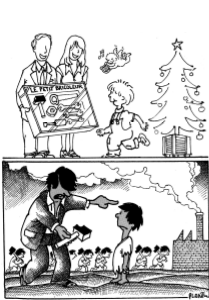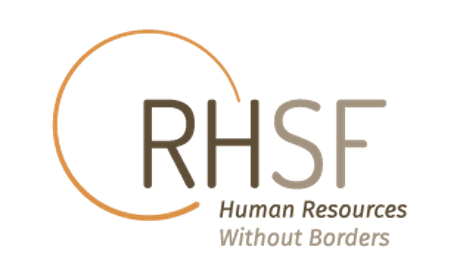Within the framework of COP 21, Human Resources Without Borders continues its commitment against forced labour.
Published on Nov 12, 2015
Climate change: alarming impact on international migration flows
The prism of COP 21, which will be held in Paris from 30 November to 13 December next, encompasses the environment but also mankind and the damage it suffers through the negative, often dramatic, effects of global warming. Global warming, even before conflicts, is already the primary source of population displacement. Forced to change region or country because of land desertification and climatic accidents, these populations find themselves in situations of extreme distress. The number of climate migrants, which is constantly increasing, is expected to reach 200 million people in 2050 when the feared changes will have reached their full extent.
The highly vulnerable situation they face exposes climate refugees to forced labour,” notes Martine Combemale, director of the association Ressources Humaines Sans Frontières (RHSF), an international NGO based in Toulouse. Today, the figures are alarming: nearly 21 million people are victims (11.4 million women and girls and 9.5 million men and boys). Nearly 19 million of them are exploited by individuals or private companies and more than 2 million by state or rebel groups. Of those working for individuals or companies, 4.5 million are subjected to forced sexual exploitation. Sponsors take advantage of this situation and generate huge illegal profits.
Large-scale forced labour occurs in Asian countries (Malaysia, Vietnam, Thailand, China, Indonesia…), Middle Eastern countries (Saudi Arabia, Qatar…). In Europe, there is a growing risk in the agriculture, cleaning and construction sectors. It concerns seconded employees. The EPR site in Flamanville is a perfect example. From 2008 to 2011, 260 Romanian and Polish workers were deprived of their basic social rights: concealed work, employment of foreign workers without a title, etc.”.
RHSF: working daily against forced labour
Created in 2006 by CSR and Human Resources professionals, RHSF aims to promote respect for human rights at work throughout the subcontracting chain. The fight against forced labour and child labour is one of the priorities of the association of the association.
This is a fight that it carries out through actions in the field, taking into account the different actors involved in this process: principals, subcontractors, employees, consumers, and by trying to reconcile the legitimate interests of all. RHSF doesn’t just point out problems and condemn bad practices,” explains Martine Combemale, “it acts in support of companies in order to concretely improve working conditions”.
RHSF is the only NGO to be present, in the framework of a pilot project, within a Chinese company. It is developing a socially innovative Human Resources Management system that reduces overtime without affecting employees’ pay. In May 2015, this project won the ATLAS – AFMI (Association Francophone de Management International) – CCMP Prize for the best case of International Management 2015. Recently, Maisons du Monde joined RHSF in order to set up a realistic and pragmatic progress plan on the company’s challenges. In addition to these numerous projects, Martine Combemale is currently in Panama to carry out a field study on fair trade : “We have launched a survey within the coffee plantations. It is in the field that we draw our expertise and verify the relevance of our information”.
RHSF also carries out awareness-raising actions with the creation of educational exhibitions. In 2015, it launched an international drawing competition to combat forced labour under the chairmanship of the cartoonist Plantu Plantu Plantu. 120 cartoonists from 47 countries around the world participated, submitting a total of 315 drawings. This travelling exhibition entitled “Behind the barcode” was a great success and raised public awareness of this global issue.

“Wonderful energies! Exciting work! Thank you Martine “
Plantu, about the exhibition “Behind the barcode
“What could be a more universal language than drawings to illustrate these terrible situations in all their diversity, and which could highlight the urgent need for action in favour of victims? “
François Delattre, Ambassador of France to the United Nations, on the exhibition “Behind the codebars”, in New-York
The travelling exhibition has been organised in Rome, at the UN in New York, in Paris on the square in front of the City Hall, in Toulouse, Turkey… It will soon take place in the Senate and in Le Bourget for the COP 21.
In the conduct of its projects, RHSF collaborates with actors and stakeholders (universities, NGOs, trade unions, companies, international organisations…) for the promotion of human rights at work in order to reduce the risks related to subcontracting. RHSF is also supported by numerous personalities: French ambassador to the UN, the Cartooning for Peace collective, Jiho… and is recognised by many universities (Malaysia, IAE Toulouse, TBS….).
Recently, it is the only organisation in France to have been selected in the framework of the European project SUSY (Sustainable and Solidarity economy) which aims at fighting poverty through the social and solidarity economy. This project is an opportunity for RHSF to recall that the shorter the chain of subcontracting, the less the risks of forced labour and child labour exist.
The Social and Solidarity Economy also makes it possible to fight against climate change, which encourages forced labour. This aspect will be addressed in particular in the context of the 18th edition of the International Solidarity Week at the “CSR and COP 21 in Africa” conference, organised on 20 November and in which RHSF is participating. In this context, the various speakers will highlight the climate and energy challenges in Africa. It will take place in the form of a web conference at Toulouse Business School. The conclusions resulting from these exchanges will be presented by RHSF on 7 December at the Paris Air Show. SSE can indeed be a transposable model combining environmental impact and human rights.
A few days before COP21, RHSF wishes to highlight and raise awareness among the various actors on the issue of forced labour. To this end, the NGO is organising or participating in numerous meetings.
RHSF and COP 21: upcoming events
- 18 November – Debate on the law on the Duty of vigilance of parent companies with regard to their subsidiaries and subcontractors.
- 20 November – As part of COP21: Franco-African webinar conference at Toulouse Business School. Open to all upon registration.
- 3 December – CSR trial in Toulouse (Blagnac Chamber of Commerce and Industry). Simulation of a trial on the theme of CSR around 3 indictments. Debates. Exhibition “Behind the barcode” Open to all with registration.
- 7 December – “Behind the barcode” exhibition at Le Bourget. Lecture given by Martine Combemale on this theme.
- 16 December – Participation in the OECD working group on the subcontracting chain.
- 17 December – Conference in the Senate on modern slavery. Presentation of the drawing exhibition “Behind the bar code”.



